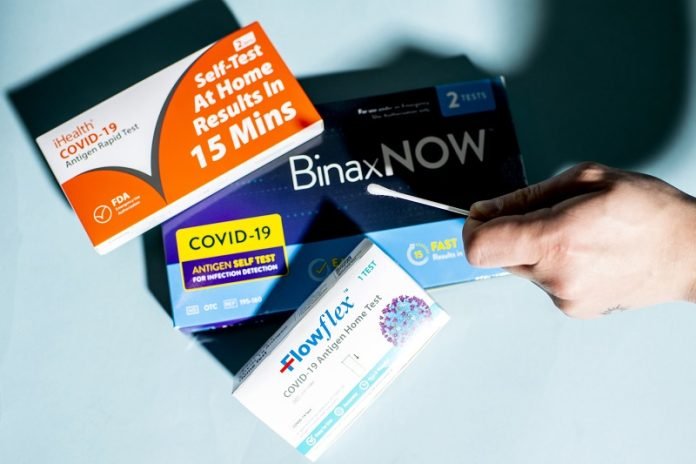
Whether you’ve signed up to bring mashed potatoes or cranberry sauce to Thanksgiving dinner, rapid tests for COVID-19 should be among your holiday preparations, according to experts at Northeastern University.
“There’s not a hard and fast rule on this,” says Brandon Dionne, associate clinical professor at Northeastern’s School of Pharmacy.
Instead, he and Neil Maniar, associate chair, professor of practice, and director of the master of public health program at Northeastern, offer some general guidelines on how to time tests to ensure the safety of guests and hosts.
There are some considerations to take into effect when considering a testing schedule, or testing cadence as Maniar terms it.
Will any people attending Thanksgiving dinner be elderly or have health conditions that might predispose them to more severe cases of SARS-CoV-2?
Will you be traveling by air, train or bus, or have you attended recent large gatherings or conferences?
And do you have any symptoms of respiratory illness, such as a runny nose, cough, sore throat or fever?
Test on Thanksgiving morning
People who are asymptomatic and won’t be associating with individuals at higher risk of COVID-19 complications can get away with taking a rapid antigen test Thanksgiving morning, Dionne says.
“The closer to the event the better off you are going to be,” he says.
People who are flying or taking public transportation and arriving Wednesday night should also test Thanksgiving day, Dionne says.
The rapid test will be able to help identify if they had been exposed to COVID-19 before their travels, he says. Then they should test again in a couple of days to see whether they picked up the coronavirus in transit—and share the results with those they might have exposed to the virus.
When to test days in advance
Individuals who have respiratory symptoms, recently attended large gatherings or conferences or who will be seeing relatives or friends in frail health will want to start testing a few days in advance of the gathering, this Monday night or Tuesday morning, Maniar says.
Depending on when you took the first test, test again Wednesday evening or Thanksgiving morning, he says.
“There’s little downside to testing,” Maniar says.
“With the current variants, the incubation time’s a little shorter,” he says. It could be two to three days or even shorter.
“I’ve seen instances where individuals are negative on a COVID test on a Monday morning. And then Tuesday morning, they test positive,” Maniar says.
What if I wake up with a sore throat on Thanksgiving?
If you can’t stay home, wear a mask and test before attending any events or gatherings, Maniar says.
Take a rapid test as close to the time of the gathering as possible, and then again the next morning, he says.
“The length of time between a possible exposure and testing makes a difference in terms of when the viral load reaches a point where it’s actually going to be detected on a test. It’s possible for a test taken in the morning to be negative and one taken eight or 10 hours later to be positive,” he says.
If you develop a sore throat, fever or runny nose after a Thanksgiving gathering, “I think it’s a good idea to test again for at least a day or two to make sure that that sore throat is not COVID.”
When to a take a PCR test
The PCR test is still the most reliable method of picking up on COVID-19 infections, but big state-operated testing centers have shut down and it will take a day or two to get results back from pharmacies that offer the tests, Maniar and Dionne say.
They say the PCR test is still recommended for people going to visit relatives and friends who are at high risk of COVID-19 complications.
But remember to take the 15-minute rapid antigen test the morning of the get-together as well.
“Just because you have a negative PCR does not necessarily mean that you are 100% negative when you get together with your friends and family” a day or two after testing, Maniar says.
Follow test instructions carefully
Follow antigen testing instructions carefully, Dionne says.
Different testing companies have slightly different instructions, and it’s important to follow them to the letter, he says.
And although it’s not necessary to jam a nasal swab so far up the nose it results in “brain freeze,” there probably should be a little discomfort, Dionne says, adding the swab should circle slowly.
Mask before gathering
Few places require people to wear masks now, and the issue of masking has become one of those political footballs that threaten to wreak conversational havoc at Thanksgiving dinner.
Even so, Maniar and Dionne recommend that people who are taking public transportation, flying or attending large gatherings start masking up days in advance of seeing family and friends at Thanksgiving, particularly if those family and friends are at risk of more severe illness from COVID-19.
“It’s a good idea to take those precautionary measures between now and Thanksgiving, between now and the holidays,” Maniar says.
“Masks are still a really important part of our toolkit to keep ourselves safe. It’s a good idea because it will significantly reduce the risk of being infected while you’re in transit,” he says.
Dionne says masking in advance of a family or friends gathering can also reduce the risk of transmitting the other illnesses going around, including flu, RSV and the common cold.
Crack a window in the house
The flu and RSV associated with a “tripledemic” of the illnesses and COVID-19 are having a particularly large effect on children and older adults and the hospitals that care for them.
Even if multiple tests show your respiratory infection is unlikely to be COVID-19, Maniar and Dionne suggest staying home or at least wearing a mask to the holiday gathering.
Do what you can to improve airflow, such as by cracking open a window, Dionne says.
Maniar says he hopes everyone gets their COVID-19 bivalent booster and flu shot before Thanksgiving, but if they haven’t to get them now.
College friendsgiving? Take a test
Testing the morning of a Thanksgiving gathering to prevent the spread of COVID-19 is a good idea even if the participants are young and healthy adults taking part in a college “friendsgiving,” Maniar says.
“There’s growing evidence that repeated COVID infections can actually increase the risk of getting long COVID,” Maniar says.
“It can lead to more complications. So you really want to continue to minimize your risk for getting it,” he says.
“A couple of years ago, we didn’t have as many tools in our toolkit to keep ourselves safe,” Maniar says.
“Now we do. This just requires individuals to take advantage of what we have available to us, including vaccinations, boosters, masks and testing.”
If you care about COVID, please read studies about the cause of post-COVID syndromes, and how vitamin B may help fight COVID-19.
For more information about COVID, please see recent studies about rare blood clots after COVID-19 vaccination, and new antiviral drug may block COVID-19 transmission.
Written by Cynthia McCormick Hibbert.



